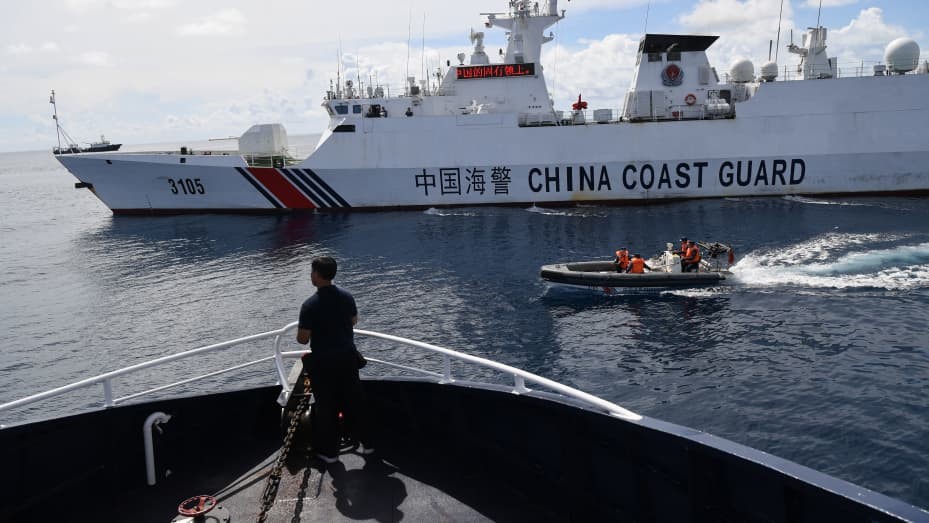The recent boarding of a Taiwanese tourist boat by China’s coast guard near the Kinmen islands, controlled by Taiwan, has induced a sense of panic among the Taiwanese population. The incident, viewed as a potential harbinger of more to come, has heightened tensions between the two nations. Despite the unease among the people, Taiwan’s military has affirmed its current stance of non-involvement.
The geopolitical tension stems from China’s territorial claims over Taiwan, a notion firmly rejected by the island nation. Beijing’s recent decision to intensify patrols and law enforcement activities around the Kinmen islands has added to the concerns in Taiwan. This move by China is perceived by Taiwan as a response to the election of Lai Ching-te as president, a figure Beijing considers a separatist threat.
Join us on Telegram: https://t.me/tfiglobal
The death of two Chinese nationals, who reportedly entered restricted waters too close to Kinmen, preceded China’s announcement of increased coast guard activities.
On Monday, six Chinese coast guard officers boarded a Taiwanese tourist boat with 11 crew members and 23 passengers, conducting inspections of its route plan, certificate, and crew licenses. Taiwan’s coast guard reported that the inspection lasted approximately half an hour.
“We think it has harmed our people’s feelings and triggered people’s panic. That was also not in line with the interest of the people across the strait,” Kuan Bi-ling, head of Taiwan’s Ocean Affairs Council, told reporters on the sidelines of parliament in Taipei on Tuesday.
Kuan acknowledged that inadvertent entries into each other’s waters by Chinese and Taiwanese tourist boats are common occurrences.
“Boats like these are not illegal at all,” she said.
Despite the incident, there has been no official response from China’s coast guard, which lacks publicly available contact details. Similarly, the Taiwan Affairs Office of China has not provided an immediate response to requests for comments.
Read More: Unseen Shadows: US Quietly Gears Up for Potential Conflict with China over Taiwan:
Kinmen, under Taipei’s control since the Republic of China government’s relocation in 1949, is strategically situated a brief boat journey from the Chinese cities of Xiamen and Quanzhou. The island, originally occupied as a result of the Republic of China’s defeat in the civil war against Mao Zedong’s communists, has been maintained by Taiwan. Although Kinmen houses a substantial Taiwanese military garrison, its waters are patrolled by Taiwan’s coast guard.
Taiwan’s Defense Minister, Chiu Kuo-cheng, emphasized the avoidance of heightened tensions in response to the recent incident, stating that the military will refrain from “actively intervening.”
“Let’s handle the matter peacefully,” he said. “Not escalating tensions is our response.”
Historically a contentious area during the Cold War, Kinmen is now a popular tourist destination, although certain islets remain restricted due to heavy fortification by Taiwanese forces.
Despite Taiwan’s regulations, China asserts non-recognition of any restricted or prohibited zones for its fishermen around Kinmen, further contributing to the complex dynamics in the region.
Over the past four years, China has consistently dispatched warplanes and warships into the airspace and waters surrounding Taiwan, emphasizing its sovereignty claims, a pattern that has persisted even after the recent election. Despite these assertive actions, a senior Taiwan security official, speaking anonymously, posits that China aims to avoid escalating the situation around Kinmen into an “international incident.”
The official contends that the Kinmen incident, marked by the deaths of two Chinese nationals, served as a pretext for Beijing to intensify pressure on Taiwan’s newly elected president, Lai. This pressure has manifested in various forms, including the loss of diplomatic ally Nauru to China and alterations to flight paths in the Taiwan Strait.
Read More: China’s FDI Hits 30-Year Low: What’s Driving the Exodus?
Despite these developments, the official anticipates that China will persist in escalating pressure on Taiwan leading up to Lai’s inauguration on May 20.
Chinese state media reported that officials from the Quanzhou Red Cross, along with family members, arrived in Kinmen to repatriate the two survivors from the boat incident that occurred last week. The vessel had capsized while attempting to evade Taiwan’s coast guard.
It is noteworthy that China has consistently maintained the option of using force to assert control over democratically-governed Taiwan. In contrast, President-elect Lai and the Taiwanese government firmly reject Beijing’s sovereignty claims, emphasizing that the determination of Taiwan’s future rests solely with the Taiwanese people. This fundamental disagreement over the island’s political status remains a persistent source of tension in cross-strait relations.
The arrival of Quanzhou Red Cross officials on Kinmen to retrieve the survivors highlights the practical and humanitarian aspects involved in addressing incidents between the two entities. Against the backdrop of differing political perspectives, the incident underscores the complexity of managing interactions and potential crises between China and Taiwan.
